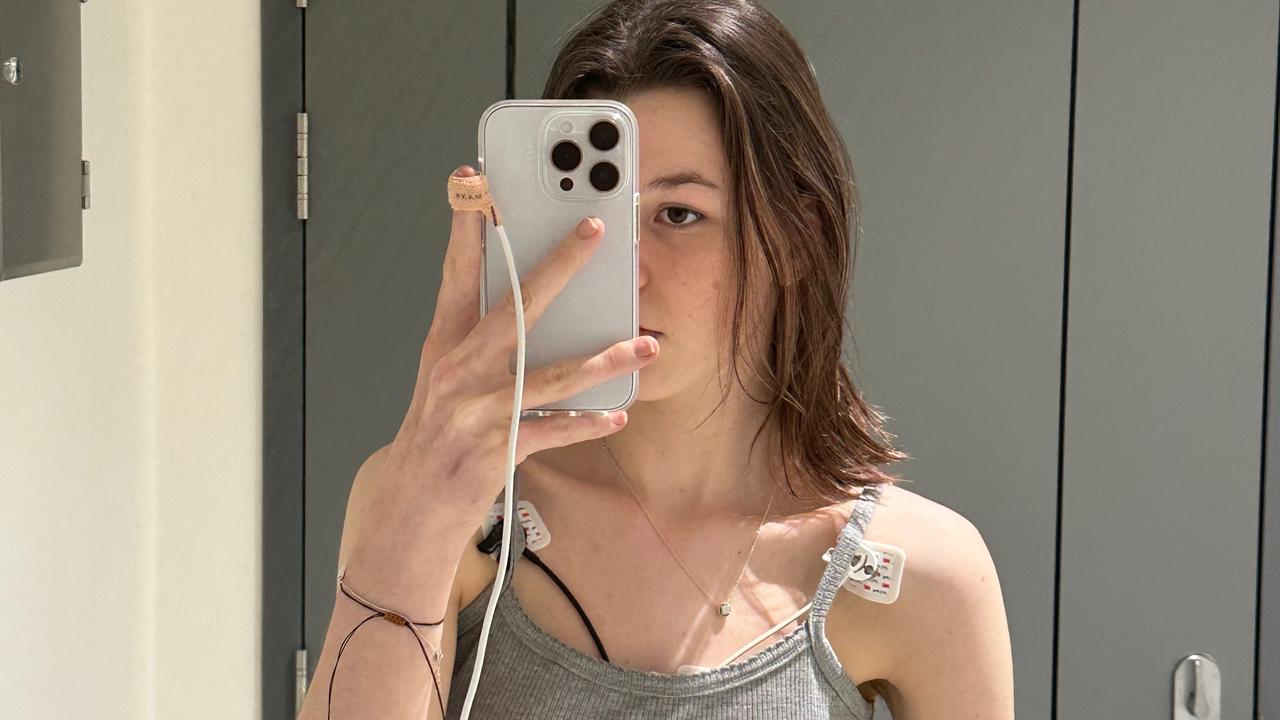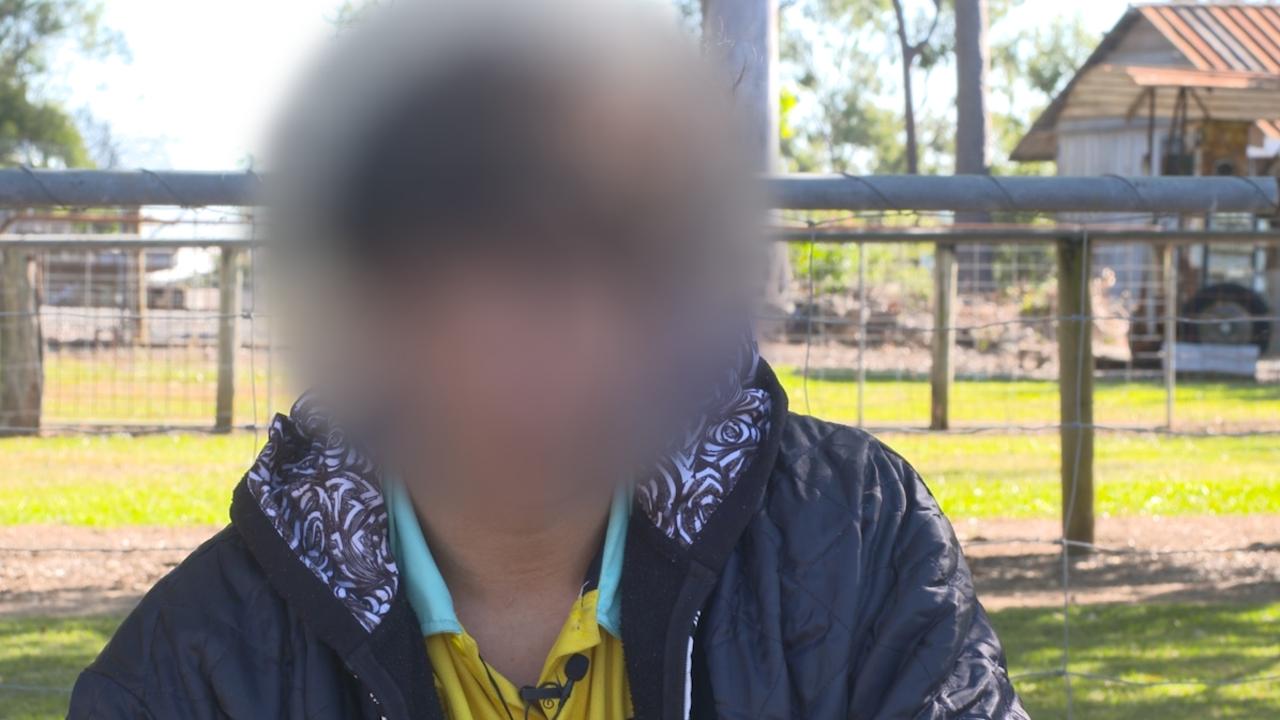The city’s small business owners are struggling to survive
Already struggling with a desperate lack of office workers and tourists, some city shop owners have had no choice but to give up in the face of the worst business conditions they have ever seen.
Coronavirus
Don't miss out on the headlines from Coronavirus. Followed categories will be added to My News.
Last week’s Covid restrictions again hammered small business owners in Adelaide’s CBD. Already struggling to cope with declining numbers of office workers in the city and a lack of tourists, some are giving up, some are thinking about it, but all agree these are the worst business conditions they have ever faced. Michael McGuire talks with some of those at the forefront of the crisis.
■ ■ ■ ■ ■
Robert Puliatti looks out the window of his basement level hairdresser and up to the quiet street outside. The street is Exchange Place. It connects Pirie St to Grenfell St in Adelaide’s CBD. There was a time, not that long ago, when Exchange Place was a bustling thoroughfare. Now, as Puliatti looks up, and this is a midweek lunchtime when the street is usually at its busiest, whole minutes can elapse without any evidence of human existence.
“It feels like a Sunday out there,’’ Puliatti says sadly
It’s one of the reasons Puliatti and his business partner in Snip ‘n’ Shape, Peter Marassiotis, are pulling the pin next month when the lease on their shop at the bottom of the Black Stump building facing Grenfell St expires.
The 66-year-old Puliatti has held a lease in this building since it opened in 1976.
He lists the many crises that failed to fell him over the years: the collapse of the State Bank, the worries that followed the September 11 terror attacks and the global financial crisis. But in the world of Covid-19, he can no longer survive.
“We have seen a fair bit, but there has been nothing like this,’’ Puliatti says.
And the latest round of restrictions, even though they have now been lifted, only added to the pain.
“The city is dead,’’ he says. “Even with generous concessions (from the landlord) to get us to re-sign, come August 19 when the lease is up, we will hand them the key.’’
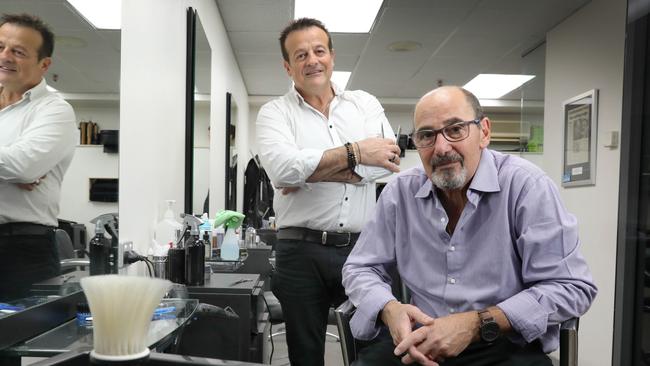
Puliatti and Marassiotis are far from alone.
Talk to just about any small business owner in the city and the story will be similar. Others are also closing and walking away from businesses they have spent a lifetime building. Others would like to but are trapped in long-running leases. Others are determined to hang on but don’t know how long they can last.
Revenue is down between anywhere 30 per cent and 50 per cent across the board. One business owner says he had to sell his home to fund his business. Many are barely scraping together an income, some earning far less than their employees.
Walking around the city, the casualties are obvious. The once-thriving Funk coffee shop on Grenfell St is gone.
The adjacent Simply Divine sandwich shop is also closed.
Across Grenfell St in the City Cross food court, six shops stand empty. Look up into the office towers of the CBD and you will see as many dark floors as those with lights on. Walk through Gawler Place, Rundle Mall and Rundle St and the gaps start to become obvious.
The problem is simple enough.
Workers who deserted the CBD during last year’s Covid-19 shutdown have not come back in enough numbers to make these businesses viable.
And most business owners don’t see that changing.
Many of their former customers have adapted nicely to working from home and don’t plan to move back to their old desks in the city. Even many of those who have come back to the city don’t make the journey five days a week.
Classic Shoe Repairs owner Massimo Sassi, who has been in the city since 1974, gives an example of what this could mean to a small business.
One of his customers, who had been working from home, came to the shop with five shirts for dry-cleaning. Before Covid-19, this was a longstanding habit, so Sassi was happy to see him again.
But whereas before those five shirts would last the customer a week, now they last him much longer because he is mixing working at the office with home.
“So that $20 a week for five shirts is now spread over 2½ weeks,’’ he says.
It’s one small example, but multiply that by all the small businesses in the CBD and by the number of missing or reduced workers and the problem becomes clear.
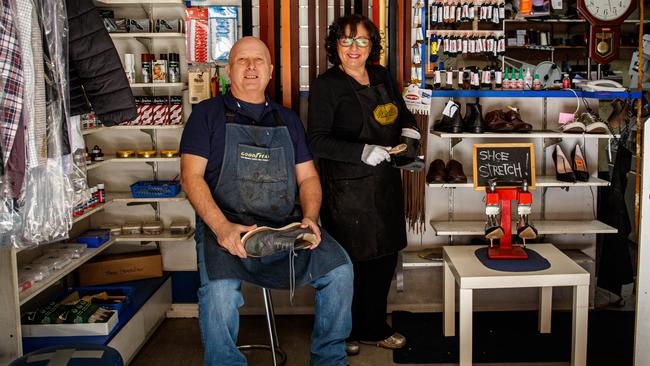
Every subsequent lockdown, or even the restrictions imposed last week, makes the situation even worse, even though the Adelaide City Council says visits to Rundle Mall have returned to pre-pandemic levels and the Property Council says office occupancy is now 78 per cent of what it was before Covid-19 struck.
Robert Kulenicz is The Watch Doctor in City Cross and says the reaction when the latest restrictions – including guidance to work from home – were announced by Premier Steven Marshall, chief public health officer Nicola Spurrier and Police Commissioner Grant Steven was immediate.
“As soon as they say anything to do with Covid, everybody panics, stays home and buys toilet paper,’’ he says. “It’s like Armageddon.’’
And business did not immediately bounce back when restrictions were loosened last Monday. It can take months if not longer.
A nearby business owner in the food court, who asked not to be named, says sales the day after restrictions were imposed dropped by $500. This owner does not know how much longer he can keep going.
“Yesterday, we were 50 per cent down on where we were before Covid,’’ he says.
He says he continues to pay his staff but he is not taking any money from the business.
“I don’t take a wage, it’s as simple as that. My staff get more of a wage than I do,’’ the owner says.
The strains on the business and owners are obvious.
At the Bean Bar on James Place, Frank Scorsonelli is worried that the stress is affecting his health. Frank and wife Teresa took over the coffee shop on February 1 last year, just as the full horror of Covid-19 was about to hit.
The Scorsonellis worry not only about the lack of office workers but also the absence of tourists who help the business tick along.
The business is also next door to the construction of the new Southern Cross Arcade and laments his shop is “constantly covered in dust’’.
He has been visiting his doctor complaining of severe stomach cramps but so far no diagnosis has been forthcoming.
“I’m going through a lot of health issues at the moment and I wonder how much of it is in the mind and caused by stress,’’ the affable coffee shop owner says.
Yet, Scorsonelli, like the others interviewed, loves his job. Before taking over the coffee shop, the 52-year-old worked in digital marketing. He loves the interaction with customers and doesn’t want to walk away.
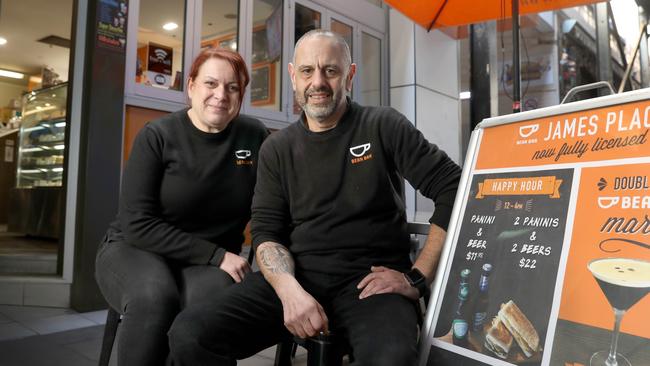
Some believe property owners need to be more flexible, to factor in that revenue hasn’t returned to pre-pandemic levels for many. During the height of last year’s lockdown, a code of conduct was implemented that prevented landlords from kicking out tenants who couldn’t pay. Reduced rents were also negotiated. But those conditions expired on January 2 and the full whack was again expected.
Many of these leases also demand annual rises of as much as five per cent. Some owners say their landlords want them to sign 10-year leases with five per cent rent increases each year and are now instituting caveats on family homes in case of non-payment.
At Hallmark Jewellers on Grenfell St, Arthur Perelman says the building above his ground floor shop has been empty since BHP moved out.
“I would never have taken the place if I had known that was going to happen,’’ he says. “It’s got to the stage where I have to think about if I want to go on.
“I don’t blame the landlord but at the same time he has to suffer some pain as well,’’ he says.
All the owners understand property owners need to make a return, too. They float various solutions. Perhaps a hardship clause could be instituted that could be activated once every lease period so that if revenue falls so does rent. Perhaps federal and state governments could institute tax relief for property owners who agree to reduce rents.
They all think that if nothing is done, then their future is bleak. Not that they want to give up.
Back at Bean Bar, Frank Scorsonelli is determined to keep going.
“We will keep fighting, we will not give up,’’ he says.



